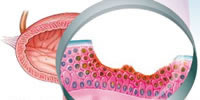Diet Modification Can Reduce Bladder Symptoms & Pain
When researchers Robert Moldwin Md, Barbara Shorter RD & colleagues at Long Island University published the results of the first formal research study exploring the role of diet and interstitial cystitis (Effect of Comestibles on Symptoms of interstitial cystitis), their results validated what thousands of patients have known for decades, that certain foods can and do trigger bladder frequency, urgency, pressure and/or pain. Ninety percent of the patients who participated in that ground breaking study reported food sensitivities, a number which has since been replicated in several IC studies. In 2013, the same research team demonstrated that men with chronic prostatitis (Effects of Foods and Beverages on the Symptoms of Chronic Prostatitis/Chronic Pelvic Pain Syndrome) share similar food sensitivities. There is no doubt that some foods hurt the bladder.
The excessive intake of caffeine is a strong risk factor. Researchers in Massachusetts found that men who drank an average of 2 cups of coffee per day were more likely to develop lower urinary tract symptoms and difficulty with urine storage while women developed progressively worse symptoms of urgency. (Intake of caffeinated, carbonated, or citrus beverage types and development of lower urinary tract symptoms in men and women.)
Diet modification is a cornerstone of bladder management and is recommended as a first line intervention in the AUA Guidelines for the Diagnosis and Treatment of IC/BPS (2011). Please note, however, that patients often have unique and individualized food tolerances.
 How Do Foods Irritate The Bladder?
How Do Foods Irritate The Bladder?
It is not unusual for a healthy bladder to become irritated by urine, such as in patients going through chemotherapy or with patients abusing ketamine. But, when you have an injured or wounded bladder, urine can reach deeper into the bladder wall where it can directly stimulate nerves, stimulate mast cells to release histamine and create profound irritation.
Foods high in acid or alkaline substances create almost caustic urine which triggers more irritation and inflammation. Similarly, foods high in caffeine are neurostimulatory and trigger those nerves which control frequency and urgency. Even healthy people will urinate more frequently after drinking caffeine. For the IC patient, however, caffeine creates yet more nerve irritation, exactly what we are trying to reverse.
Patients who consume excessive amounts of coffee, tea and soda often a pay a high price for their junk food with often agonizing chronic pain that could last for years. However, with simple diet modification suggestions, pain may reduce dramatically. It’s certainly worth trying!
Foods That Hurt The Bladder
- CAFFEINE – Caffeine acts as a diuretic, stimulating more frequent urination and also causes urine to become more concentrated with urea and ammonia. All caffeinated products (coffees, teas, green teas, energy drinks, etc.) should be stopped immediately.
- ACIDIC FOODS – Foods high in acid (i.e. citrus fruits and juices, cranberry, vinegar) create irritation in much the same way that acid poured on a wound on your hand would feel. It hurts! Cranberries, for example, contain quinic, malic and citric acid which may help us understand why cranberry juice is irritating for most of us.
- ALCOHOL – In an ICN Survey, beer, wine and spirits bothered roughly 95% patients though there is some wiggle room with lower acid varieties.
- POTASSIUM – Some, but not all, patients may struggle with high potassium foods though research studies have found that bananas and yams, both high in potassium, are usually bladder soothing. Try small amounts of high potassium foods to see if you tolerate them well.
- HISTAMINE – Researchers have found that the bladders of IC patients have high numbers of activated mast cells. These mast cells have released histamine which then provokes an allergic reaction in the bladder, triggering frequency, urgency and/or pain. Not surprisingly, foods high in histamine, such as chocolate and red wine, are well known to trigger bladder discomfort.
- ARTIFICIAL SWEETENERS – Both research studies and patient stories have confirmed that most artificial sweeteners (aspartame, saccharin, sucralose, etc.) appear to be bladder irritating, particularly aspartame (i.e. NutraSweet®). Most diet products, such as sugar free iced tea or soda, should be avoided.
- MSG, NITRITES & NITRATES – MSG is a mast cell degranulator and for patients sensitive or allergic to it, can cause rash, hives, asthma and sudden diarrhea known as”Chinese restaurant syndrome.” IC patients have long reported that foods containing high levels of MSG and/or nitrates trigger bladder symptoms and discomfort, thus we suggest avoiding these foods whenever possible.
- VITAMINS & SUPPLEMENTS – Both patients and research report that multivitamins can trigger bladder symptoms due, most likely, to high levels of Vitamin C (ascorbic acid) and Vitamin B6. Unless you have a medical condition that requires using a multivitamin, we suggest that you avoid vitamin supplements and waters in favor of eating fresh foods and vegetables. If you need a multivitamin, we suggest trying MultiRight, a low acid multivitamin and mineral complex that the IC Network helped to develop. It works well for most patients.
- CHOCOLATE – Chocolate contains several ingredients that have the potential to exacerbate IC symptoms: theobromine, caffeine, phenylethylamine, tannins and oxalates. Well known for triggering migraine headaches, IC patients often report flares from eating chocolates, particularly cheaper milk chocolate products
- GLUTEN – In The Better Bladder Book, author Wendy Cohen was the first to suggest that gluten could be irritating some patients. It’s worth experimenting with gluten free products to determine if gluten could be a source of irritation.
(Author: Jill Osborne MA – Updated – January 22, 2016)

